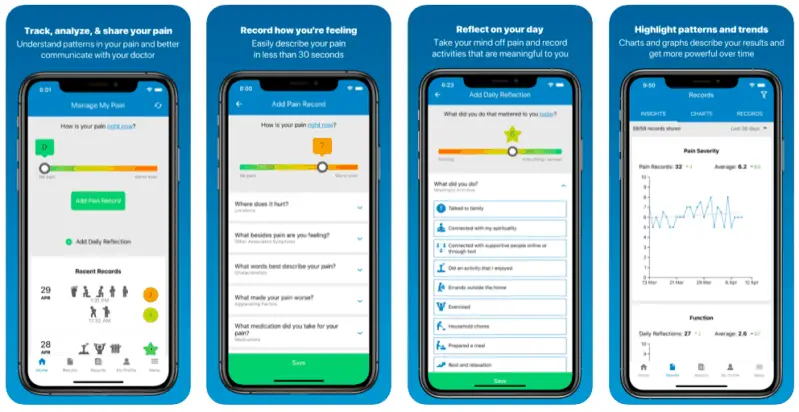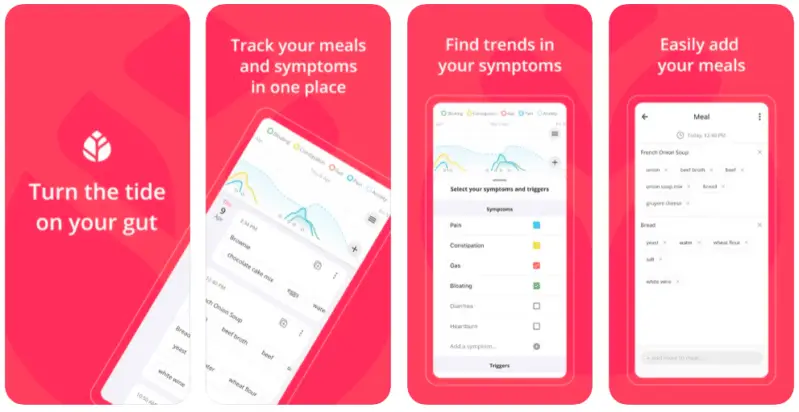These days, symptom tracking is as simple as clicking a few buttons on an app and sharing the data. But which one is the best? And which one is free? Don’t worry – I’ve got your back. Here are my top recommendations that I know anyone with a chronic illness will love.
It makes me laugh to think back at how I used to track my health symptoms before smartphones came about.
Data capturing consisted of me:
Don’t even get me started on the laborious process of including a photo in that day’s notes.
But tracking your symptoms is an essential part of managing your chronic illness – so I had to do it!
It helps track your overall progress and share relevant information with your healthcare providers.
Without it, it’s much harder to see what meds, treatments or lifestyle issues you may need to adjust and what course of action would be most appropriate.
But we’re on to bigger and better things these days, and I’m here to share it all with you.
What is a Digital Symptom Tracker?
A digital symptom tracker is an application you can use on your phone to monitor all the symptoms you experience because of your chronic illness(es) daily.
The difference between logging your symptoms manually and using a digital app is simple: efficacy and convenience.
A symptom tracking app should make it easy to:
Say goodbye to paperwork, spreadsheets and trying to scroll through the photos on your phone to find something you need to show your doctor at your next appointment – symptom tracker apps take care of it.
And if you’re wondering whether I am sponsored by some wellness app – I’m not! I genuinely believe symptom trackers make your life so much easier.
Key Features to Look for in a Symptom Tracker App
I’m going to share some of my favourite apps in just a moment – but before I do that, I want you to remember these five essential features any symptom tracker must have.
Reminders and Push Notifications
Life gets busy – I know it! And even if your life is not busy, chronic illness can make your brain fog unbearable – so logging your symptoms every day can be challenging to remember.
Any good app should give you the option to send friendly reminders at a particular time (when you know you’re likely to be free) so that you can reflect on the symptoms you’ve experienced that day.
On a side note – if brain fog is something you’re experiencing, then I highly recommend reading this before you start panicking: 11 Tips for Staying Organised with Brain Fog
Data protection
I cannot emphasise this enough – no matter what app you use, it MUST locally encrypt the data you share with it. This way, if your phone is stolen or hacked – no one can gain access to it without your permission first.
Data sharing options
Ensure that the app provides remote access to the data you’ve added. That way, you don’t need to have your phone on you to access your information.
This becomes particularly important if your phone gets lost or you need to share your findings with your doctor. Ideally, you want an app that can collect your data and provide health reports and correlations.
Data collection versatility
Make sure the app can record the exact symptoms you’re interested in tracking. This is especially important if you have a rare or unique condition that needs a personalised management approach.
A Simple User Interface
It might be tricky – but don’t get caught up in the bells and whistles of an application. It might look pretty, but is it easy and practical to use?
Trust me – pretty apps get old very fast when all you want to do is log your health information so you can carry on with your day.
But you’re caught up engaging with content that doesn’t interest you or wastes your time.
A simple user interface also means clean and easy to read. Some apps that are not very well developed are also not good options because they often make it complex or confusing to log and recall the information you share.
How Do You Track Medical Symptoms?
The beauty of a digital chronic illness symptom tracker is that it guides you into tracking your medical symptoms systematically and cohesively. So you don’t have to worry that much about how you tackle the task.
But in general, it helps to understand why it’s so important to track your medical symptoms first.
The overall objective is to collect enough data to understand how your symptoms present in your body so you can treat (or manage) them in the best way possible.
The key is to remain consistent with the questions you’re asking and the frequency of answering them.
Here’s what you need to ask yourself:
My Top 7 Recommended Symptom Tracking Specific Apps
If you’re looking for an app to help you manage your health overall, you might want to look at this article: Top 13 Best Apps for People with a Chronic Illness in 2022.
We don’t just look at symptoms there – we look at how you can manage your chronic illness using an entire digital ecosystem.
And how it greatly benefits you (the patient) because it helps your doctor find a personalised health plan for you.
We also talk about whether it’s worth splurging on a paid-for app or if you should just stick with a free option, and we uncover the truth about some of the most popular apps out there.
But for now – let's get back to the my favourite symptom tracking apps 🙂
I’m going to share the best apps I’ve tried and tested. If it’s listed here – know that I believe it to be worthwhile using, even if it has a slightly lower score than the others.
I’ve also awarded some of these apps with an ultimate ranking. So if you’re looking for the best free app or even the best chronic pain symptom tracker – I cover it all.
Symple
Rank: The best overall chronic illness symptom tracker and journal
Overall score: 9/10
What makes it unique: Like its name suggests – Symple is so simple and easy to use. It has one of my favourite user interfaces because it’s easy on the eye and quick to use.
It’s not an app you need to spend hours on to log your symptoms.
Why I like it:
Why I don’t like it: It’s hard to fault this app because it’s one of my favourites.
The only thing that could be challenging is if you haven’t bought into the smartphone and smartwatch system. Without it – you’ve immediately lost half the appeal.
Cost: It has a basic free product with an option to upgrade for
$8.99 per month.
You can monitor five symptoms and five factors that affect your wellbeing at no charge. You pay to increase the number of symptoms you track and access the additional features.
CareClinic
Rank: The best holistic chronic illness symptom tracker
Overall score: 8/10
What makes it unique? CareClinic is a self-care app that lets you track and manage your symptoms holistically as part of your wellbeing plan.
This means you simultaneously follow your medication, nutrition, fluids, fitness, symptoms, weight, and blood pressure.
Why I like it:
Why I don’t like it: Unfortunately, CareClinic is a paid for application. Although it does give you a 3-day trial, it does not have a free version for people to use.
Cost: $59.99 for a year or $11.40 per month
Health Storylines
Rank: The best free chronic illness tracker app
Overall score: 8/10
What makes it unique: Health Storylines has genuinely got the highest number of benefits for free out there.
Unlike most free apps that offer essential services – Health Storylines is a lot more useful as it helps you collect both qualitative and quantitative data over an extended period.
What I like:
What I don’t like: It doesn’t list an extensive range of chronic illnesses. So if you suffer from something more rare, it’s unlikely to cater to you.
Cost: Free
HealthTrak
Rank: The simplest health symptom tracker app to use
Overall score: 7/10
What makes it unique: This app is specifically designed to help you manage your symptoms alongside your medication.
Often, when you have to take a bunch of meds, your symptoms end up varying. This makes finding correlating issues between your meds and your symptoms easier.
What I like:
What I don’t like: Your symptom tracking data is presented in a slightly cluttered and overwhelming way – especially if you’re managing many symptoms. It can be a bit difficult to follow.
Cost: Free
Patients Like Me
Rank: The best community-based chronic illness symptom tracker app
Overall score: 9/10
What makes it unique: Patients Like Me is a health information sharing app (and website) where you can use your health data to answer any questions you might have about your condition and the symptoms you experience.
You can then connect with other people experiencing similar issues.
What I like:
What I don’t like: The site and app are both hard to fault. I personally find the user journey easier on its website than the phone, but it still works well.
Cost: Free
Manage My Pain

Ranking: The best free chronic pain tracker app
Overall score: 9/10
What makes it unique: MMP is a fantastic app that you can use to manage all symptoms and issues you’re experiencing related to chronic pain.
You can also use it to document your conditions medications and then report on the severity of your pain when you want.
What I like:
What I don’t like: I’m stumped! There’s nothing about this app that I don’t like, down to the cost. I highly recommend it if you suffer from chronic pain.
Cost: Free
Talli Symptom Tracker
Overall score: 7/10
What makes it unique: Talli let's you add profiles for your loved ones on one device and track their wellbeing too. You can export and share your data with others. However, it’s presented in a basic format.
What I like about it:
What I don’t like about it: The simple user interface is also something I dislike about the app (yes, I know I’m contradicting myself). But I find it can be too simple.
The number of symptoms you can monitor is limited to what the app offers (approximately 30 symptoms).
So if you’re monitoring a relatively basic set of issues, then it works well – but if you need to track something like tremors due to neuropathic pain, you’re not going to be in luck.
Compared to what the other symptom trackers offer – it’s very minimal.
Cost: Free
Endive

Overall score: 7/10
What makes it unique: Endive allows you to track what you eat and any symptoms or triggers you pick up on during that time (related to your gut and whole body). It then is compiled into a weekly report for you to look back over.
What I like:
What I don’t like: If you only have gut-related issues, then this app is simple to follow.
However, if you have various conditions, you need to consider how each one affects your body in different ways and omit it from the app data.
For example, you may have eaten extremely well, but your pain is sky-high because you have fibromyalgia too, and the weather has been bad.
You need to decide whether to report on your pain levels or not – knowing they aren’t food-related.
Cost: Free with the option to upgrade to full access for $2.99 per month
I hope you give one of these apps a go and let me know if you feel your needs are met.
Otherwise, I hope you enjoyed learning about the best symptom trackers out there and let me know if you try them and like using any personally!
Happy downloading, everyone!
